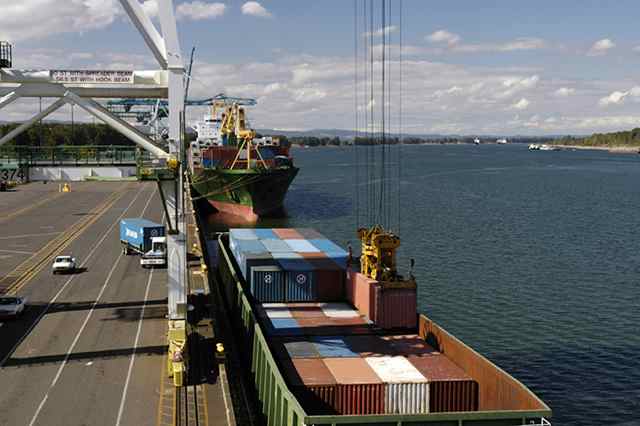forum
library
tutorial
contact

Portland Container Shipping
Faces Broad Challenges
by Mateusz Perkowski
Capital Press, September 22, 2016
|
the film forum library tutorial contact |

|
Portland Container Shipping
by Mateusz Perkowski
|
"We're a niche port, we always have been," Leavitt said.
 SALEM -- Labor disputes are often blamed for discontinued ocean container shipping at Port of Portland's "Terminal 6," but the facility faces broader problems, a port executive said.
SALEM -- Labor disputes are often blamed for discontinued ocean container shipping at Port of Portland's "Terminal 6," but the facility faces broader problems, a port executive said.
Even if conflicts between the port, the terminal operator and the longshoremen's union were resolved, turmoil in the global shipping industry would affect the facility, said Keith Leavitt, the port's chief commercial officer.
"There's no one silver bullet here," Leavitt said during a Sept. 22 hearing before the Oregon House Interim Committee on Agriculture and Natural Resources.
Ocean carriers ordered gigantic "megaships" nearly a decade ago that can carry a huge number of containers with the idea of improving efficiency, he said.
Now that the vessels have come online, though, there's not enough cargo to justify the investment, Leavitt said.
"They are not filling those vessels because the demand for space on those vessels is not keeping up with capacity," he said.
As a result, the price of freight on ocean liners has dropped so low that shipping companies aren't able to pay off debts, which recently caused the bankruptcy of Hanjin, a company that long serviced the Port of Portland before stopping service last year, he said.
Because ports are afraid of not getting paid for loading and unloading containers from Hanjin ships, that's left a lot of cargo stranded across the globe, including Northwest farm goods, Leavitt said.
Leavitt said he expects the shipping industry's problems will be sorted out over the next several years, but even then, Port of Portland's Terminal 6 will face some headwinds.
The new "megaships" carry up to 25,000, 20-foot-long containers, but the Port of Portland can only handle ships that carry 7,000 such containers, he said.
"The megaships are just not going to be calling on the Columbia river," said Leavitt.
However, it's difficult to imagine that Pacific Ocean shipping will be reduced to megaships traveling between large ports in Hong Kong and Los Angeles, he said.
Terminal 6 should be able to attract some vessels, but the facility's niche is likely to be more "surgical" than it was in the past, he said.
"We're a niche port, we always have been," Leavitt said.
Shelly Boshart Davis, whose family owns farming and trucking operations, agreed that the resumption of activity at Terminal 6 "wouldn't fix everything," but it would help Oregon agriculture remain competitive.
Baled straw was, by volume, the largest Oregon export commodity to depend on containerized shipping from the Port of Portland, said Boshart Davis. Even so, less than 40 percent of the state's straw volume passed through that facility.
When productivity at West Coast ports severely declined during labor contract negotiations between longshoremen and port operators in late 2014, straw that would have been exported to Asia backed up in Oregon, she said.
That higher inventory, in turn, depressed prices for growers, Boshart Davis said.
Shipping complications have also affected the Christmas tree industry, particularly in export destinations like the Philippines, where retailers expect to display trees by mid-November, said Gayla Hansen of Kirk International, which exports trees.
The more time Christmas trees spend on the dock, the less profit there is for exporters, she said. "There is no one to call to help you. You're on your own. There's no hotline."
The lack of containerized shipping at the Port of Portland has indirect effects on the nursery industry, because fewer trucks are available in the area, said Leigh Geschwill, president of the Oregon Association of Nurseries.
"Not having a fully functional port reduces the number of trucks willing to come," she said.
learn more on topics covered in the film
see the video
read the script
learn the songs
discussion forum
